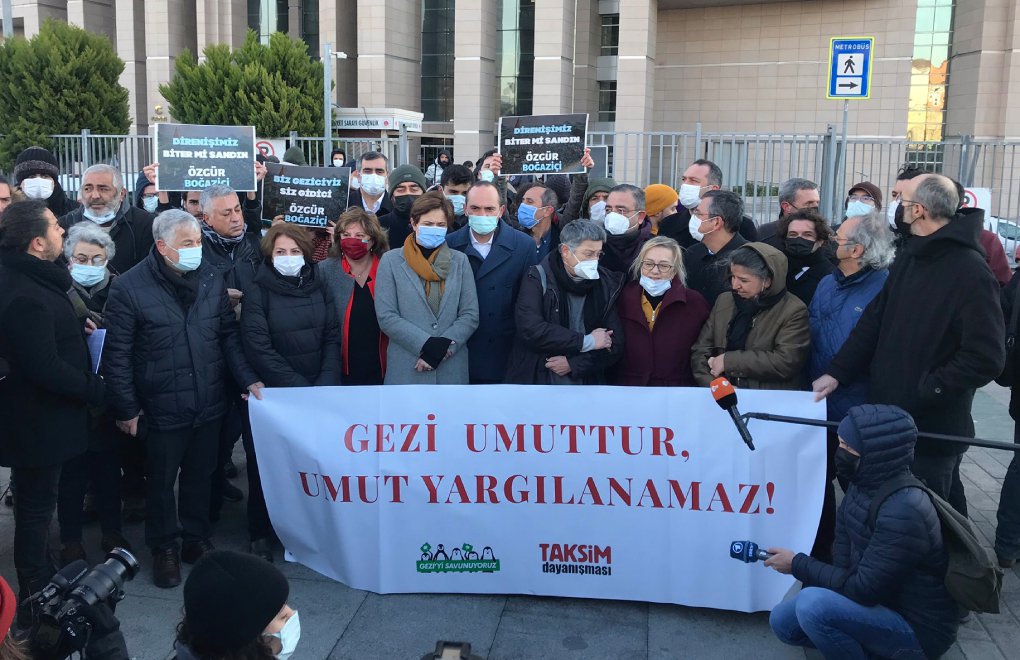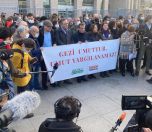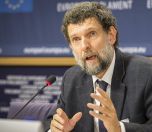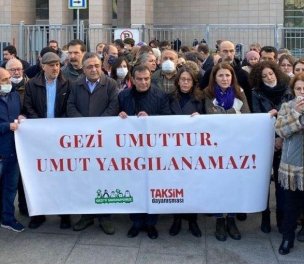Click to read the article in Turkish / Kurdish
The trial of 52 people, including businessperson and rights defender Osman Kavala, who has been arrested for 1,539 days, people such as Mücella Yapıcı, Ali Hakan Altınay, Çiğdem Mater Utku, Mine Özerden, Can Atalay, Tayfun Kahraman, Yiğit Aksakoğlu and Yiğit Ali Ekmekci, and the defendants of the çArşı case, which was merged with the Gezi trial, continued at the İstanbul 13th High Criminal Court today (January 17).
After President and Justice and Development Party (AKP) Chair Recep Tayyip Erdoğan called him "the leftover of Soros", Osman Kavala said that these remarks left "no possibility for a fair trial" and his "participation in the hearings and presenting a defense would be meaningless."
Accordingly, Osman Kavala did not attend the hearing today while defendants Tayfun Kahraman, Mücella Yapıcı, Can Atalay, Hakan Altınay, Mine Özerden and Yiğit Ali Ekmekçi made their statements.
Handing down its interim ruling, the court board, by a majority of votes, has ruled that Osman Kavala shall remain behind bars.
The hearing today was also followed by Osman Kavala's spouse Prof. Ayşe Buğra, main opposition CHP MPs Özgür Özel, Sezgin Tanrıkulu and Ali Şeker and CHP İstanbul Organization Chair Canan Kaftancıoğlu as well as representatives from the consulates of Sweden, France, Italy, Belgium, the European Union (EU), the US, Norway and the Netherlands.
Atalay talked about Gezi
After the Taksim Solidarity made a statement in front of the İstanbul Courthouse in Çağlayan ahead of the hearing, the hearing started.
Having said at the hearing on November 26, 2021, "We would like to tell you about Gezi at length, we would like to defend Gezi. We would like to present our defense at the next hearing if you accept," lawyer Can Atalay took the floor at the hearing and talked at length about the Gezi resistance in 2013. As reported by "Defending Gezi" Twitter account, Can Atalay briefly stated the following in his statement before the judge:
"This is not a defense statement. We said that we would tell you about Gezi. Now is the time.
"This trial is the product of a mob. This case shows that you do not understand what the Gezi resistance is about. Your indictment is the historical thesis of the ruling political party; thus, it is not a legal text, but a political statement.
"With no grounds or evidence, this eclectic historical thesis desperately describes our Gezi resistance as an international plot, so it is condemned to failure. Not the prosecutor's office but the powers it represents ask that we surrender. We shall never surrender.
"No one dares to accuse the millions of people who exercised their constitutional rights on the streets during Gezi of using funds. No participant of Gezi can be linked to a single penny, yet the job training of the prosecutor who wrote this indictment is funded by the EU.
"We are not anyone's subjects. We will not become citizens who wait for words spoken by any individual to act.
"Against the purse-snatching crony capitalism of the Justice and Development Party, citizens protected their rights, objected, and stood shoulder-to-shoulder as they defended Gezi Park in Taksim.
"They sought to close off Taksim Square, the most important location of rights' struggles. So the question the prosecutor must ask is this: 'To whom was Taksim Square promised, to whom was it offered that so much aggression had to be applied against citizens?'
"This indictment also seeks to criminalize the Istanbul Urban Rally in December 2013, but does not mention Elif Çermik, who was murdered by excessive pepper gas use in Kadıköy on that day. [...] The indictment also mentions September 10, 2013, but it does not mention Ahmet Atakan.
"The indictment wants to remove Ali İsmail Korkmaz from our dreams, who was beaten to death in a side street of Eskişehir, and seeks to pass as a complainant his murderer, Mevlüt Saldoğan. [...] The indictment is full of sections about Berkin Elvan's funeral, but it does not mention the systematic protection given to those responsible of a child's murder. And you cannot talk about the Gezi resistance without naming Ethem Sarısülük.
"The indictment wants us to forget two of our brothers who passed away in two corners of Turkey on June 3, Mehmet Ayvalıtaş and Abdullah Cömert.
"The indictment mentions the press statement on June 28, but does not state how, after many years, hundreds of thousands of people poured into the streets to bid farewell to our loss on the other side of the Euphrates, for Medeni Yıldırım.
"We are not in detention, but there is a defendant in detention in this case. And patience no longer serves us well.
"Gezi is the hope for equality, freedom and justice. We will win. We will continue our struggle together. And we will win together."
Kahraman: It is made up of millions of people
In his statement at court, defendant Tayfun Kahraman also talked about the Gezi resistance, briefly stating the following:
"We will continue to object to any project that will destroy İstanbul or seek to take Taksim Square from the people.
"It was society's conscience that took to the streets during Gezi. I have never in my life witnessed aggression on the scale that targeted the people during Gezi.
"No amount of power, money or authority can organize people to take to the streets in 80 provinces. The Gezi resistance is made up of millions of people."
Yapıcı: It was people's conscience standing up
In her statement before the court, defendant Mücella Yapıcı briefly stated the following about Gezi and the judicial process:
"In a country where there is so much poverty, murders, unsolved murders, how can you put us on trial for practicing our profession, and ask for capital punishment?
"In the middle of the night they came and began to demolish the park. The people stood against it. So we, too, went there with the presidents of associations. We were subjected to extraordinary amounts of pepper gas. I have suffered from COPD since then.
"It was the people's conscience that stood up at Gezi. No political movement or political figure can bring so many different-minded people in 80 different provinces of Turkey to create such incredible empathy and sisterhood.
"So now they hold OsmanKavala as hostage. They try to criminalize Gezi. Judges, my words are not for you. I feel sad for you. After all, judges who rule for acquittal are not seen again.
"Gezi is honor. They may try to create a different, criminal Gezi, but #Gezi has already taken its place in history."
In his statement, Hakan Altınay also briefly said:
"I do not understand what I am accused of. The accusations are based on absolutely no evidence or concrete fact. It gives me sorrow that such indictments can be written in my country. [...] I have worked for the good of my country. I have never had any intention of carrying out a coup. So, I thought, how do I explain an intention I never had?"
Following the statement, the hearing was recessed for an hour.
Özerden: What did you find wrong about acquittal?
After the recess, the hearing continued with the statements of defendants Mine Özerden and Yiğit Ali Ekmekçi as well as the defendants' lawyers. Mine Özerden briefly said:
"I can't understand why I am here. My lawyer asked the prosecutor to provide us with the accusations I face, but this request was rejected. So am I supposed to think up a suitable crime for myself?
"What was it about the acquittal ruled by the 30th Heavy Penal Court that you found wrong? Tell us so we can defend ourselves and present evidence accordingly.
"Although none of the accusations against him have been proven, Osman Kavala remains in detention. Why? Are we not supposed to ask?"
Presenting his statement at court, Yiğit Ali Ekmekçi briefly said: "It appears that the prosecutor is not bothered about providing evidence for his claims. This leaves us with the impossible task of proving that something which has not happened did not happen."
No release, again
After Ekmekçi's statement, the lawyers of Osman Kavala and the çArşı case took the floor and made their statements.
Edip Şahiner, the prosecutor of the hearing, pronounced his opinion as to the accusations afterwards and demanded that the requests of Mine Özerden and Hakan Altınay for lifting their control measures and the defendants' requests for being exempted from the hearings be accepted. Şahiner also demanded that Osman Kavala's imprisonment continue.
Handing down its interim ruling, the court board, by a majority of votes, has ruled for the continuation of Kavala's arrest.
The court board has accepted the request for exempting the defendants who made such a request from attending hearings while it has ruled that the international travel bans shall remain in effect. The next hearing of the case will be held on February 21, 2022.
About Gezi trialThe Gezi trial began again on May 21, 2021 as the court of appeals overturned the verdicts of acquittal given by the local court. Arrested for over 1,200 days, businessperson and rights defender Osman Kavala and 15 other defendants appeared before the judge at the İstanbul 30th Heavy Penal Court in Çağlayan on charge of "attempting to overthrow the government." Here is a brief overview of the judicial process: Who is on trial?Osman Kavala, Mücella Yapıcı, Can Atalay, Tayfun Kahraman, Ali Hakan Altınay, Yiğit Aksakoğlu, Yiğit Ali Ekmekçi, Çiğdem Mater Utku and Mine Özerden, who were acquitted in the first trial; and Can Dündar, Mehmet Ali Alabora, Ayşe Pınar Alabora, Gökçe Tüylüoğlu, Handan Meltem Arıkan, Hanzade Hikmet Germiyanoğlu and İnanç Ekmekçi, whose files were separated, but have been merged again afterwards. Even though he was acquitted in the Gezi trial, Osman Kavala has been behind bars in Silivri Prison at the outskirts of İstanbul for over 1,200 days. Yiğit Aksakoğlu also served 220 days behind bars ias part of the Gezi trial. Who are the aggrieved parties?In the Gezi trial, where rights defenders were acquitted, the members of the 61st term cabinet, which was established in 2011, were referred to as the complainant aggrieved parties in the indictment. On the list of the aggrieved parties were the then PM Recep Tayyip Erdoğan, the then Deputy Prime Ministers Bülent Arınç, Ali Babacan, Beşir Atalay, Bekir Bozdağ, Emrullah İşler and the then Ministers Binali Yıldırım, Fatma Şahin, Egemen Bağış, Nihat Ergün, Faruk Çelik, Erdoğan Bayraktar, Ahmet Davutoğlu, Taner Yıldız, Suat Kılıç, Mehdi Eker, Hayati Yazıcı, Muammer Güler, Cevdet Yılmaz, Ömer Çelik, Mehmet Şimşek, Nabi Avcı, İsmet Yılmaz, Veysel Eroğlu, Mehmet Müezzinoğlu, Zafer Çağlayan and Sadullah Ergin. After founding the Future Party, Ahmet Davutoğlu announced that he withdrew from the files of criminal cases related to the crimes committed against him personally and were not of public nature, especially from the trials for insult, as an aggrieved party. DEVA Party Chair Ali Babacan also said, "I am not a complainant in the Gezi trial, nor am I an intervening party. Thinking that they were aggrieved, the prosecutor wrote the names of all members of the then government one by one. In our judicial system, there is no such thing as withdrawing from the position of an aggrieved party." What are the defendants charged with?In the first 657-page indictment, Gezi was defined as "a resurrection for coup". The defendants were accused of "organizing and funding the protests." They were charged with "attempting to overthrow the government", "damaging property", "damaging places of worship and cemeteries", "violating the Law on Firearms, Knives and Other Tools", "aggravated plunder" and "violating the Law on Protecting Cultural and Natural Assets." In reversing the acquittals, the court of appeals has also demanded that a criminal complaint be filed against the defendants on the grounds that they violated the Law no. 2911 on the Meetings and Demonstrations. According to the indictment, 16 defendants separately face 606 years to 2,970 years in prison on the offenses charges. What has happened till today?In July 2013, 26 people, including Mücella Yapıcı from the Chamber of Architects and Ali Çerkezoğlu from the İstanbul Medical Chamber, were detained. While they were released following their statements, the rights defenders faced a lawsuit for "founding and leading an organization" in March 2014. All defendants were acquitted in the ensuing trial heard by the İstanbul 33th Penal Court of First Instance on April 29, 2015. Afterwards, it was understood that prosecutor Muammer Akkaş was carrying out an investigation against the people who are currently on trial. Akkaş was also the person who gave the instruction to wiretap the rights defenders' phones. However, he was dismissed as part of an investigation into the December 17-25, 2014 operations and fled Turkey. İstanbul Public Prosecutor Yakup Ali Kahveci took over the file after Akkaş. The investigation, which also consisted of the evidence collected by Akkaş, was completed in 2019; the first hearing was held on June 24. Arrested pending trial, Yiğit Aksakoğlu was released at this hearing. A fews days after the second hearing, the Board of Judges and Prosecutors (HSK) changed the court board hearing the case. Accordingly, Galip Mert Perk was assigned as the Presiding Judge and Talip Ergen as a member of the court board. While the HSK did not change the place of duty of senior member Ahmet Tarık Çiftçioğlu, who had ruled in favor of the "continued arrest" of both Osman Kavala and Yiğit Aksakoğlu, the member of the court board who had expressed a dissenting opinion to the related ruling was assigned to another court. Examining the individual application of Osman Kavala, the European Court of Human Rights (ECtHR) pronounced its ruling of right violation on December 10, 2019 and ruled that Osman Kavala should be released immediately. At the final hearing on February 18, 2020, all defendants, except for the ones who were abroad, were acquitted of the offenses charged. Despite this acquittal and the ECtHR judgement, Osman Kavala was arrested again on another charge. Why are they on trial again?Following the acquittals in the Gezi trial, President and Justice and Development Party (AKP) Chair Recep Tayyip Erdoğan spoke at the group meeting of his party. Targeting Kavala, he said, "The person who stirred up Gezi was behind bars. They tried to acquit him with a maneuver." Shortly after this statement was made, the Board of Judges and Prosecutors (HSK) launched an inquiry against the three judges who were the members of the board of the İstanbul 30th Heavy Penal Court. The prosecutor's office also appealed against the verdicts of acquittal. Public Prosecutor Edip Şahiner demanded that the acquittals be reversed. The 3rd Penal Chamber of the İstanbul Regional Court of Justice, the court of appeals, reversed the rulings of acquittal handed down by the local court, the İstanbul 30th Heavy Penal Court, on January 22, 2021. Referring to the charges brought against the defendants in the indictment, the court justified its reversal by indicating that the pieces of evidence such as the defendants' social media posts, press statements and slogans chanted were not considered in handing down the ruling. |
A brief summary of Osman Kavala's arrest17 October 2017: Osman Kavala was detained. 1 November 2017: Kavala was ordered arrest on the charges of 'attempting to overthrow the government or to prevent it from exercising its functions' (Article 312 of the TCC) and 'attempting to overthrow the constitutional order through force and violence' (Article 309 of the TCC). 24 December 2018: The investigation files under Article 309 and 312 of the TCC were separated. 19 February 2019: The first indictment against Kavala was issued under Article 312 of the TCC 16 months after he was arrested. 11 October 2019: A release order was issued in favor of Kavala on the charge under Article 309 of the TCC. 10 December 2019: The ECtHR ruled that Kavala's detention constituted a violation of human rights and that he should be released immediately. 18 February 2020: A decision of acquittal was issued in the trial heard under Article 312 of the TCC. 19 February 2020: After the decision of acquittal, Kavala was not released but was arrested again on the charge under Article 309 of the TCC. 9 March 2020: Kavala was ordered arrest under Article 328 of the TCC. 20 March 2020: The second release order was issued in favor of Kavala under Article 309 of the TCC. However, his detention on the charge of espionage under Article 328 of the TCC continued. 3 September 2020: The Committee of Ministers of the Council of Europe, which oversees the execution of the judgments of the ECtHR, ruled that the judgment of the ECtHR should be executed and that Kavala should be released immediately. 29 September 2020: The Constitutional Court of the Republic of Turkey decided to examine the application of Kavala regarding his unlawful detention. However, it postponed the examination as the second indictment including the charges under Articles 309 and 328 (espionage) of the TCC was submitted to the court on the same day. 29 September 2020: In the second meeting in which this matter was discussed, the Committee of Ministers of the Council of Europe ruled that an interim decision should be drafted to be issued in the event that the judgment of the ECtHR is not executed. 3 December 2020: The Committee of Ministers of the Council of Europe issued an interim decision that Kavala should be released immediately and that the Constitutional Court should examine the file in accordance with the judgment of the ECtHR without further delay. 15 December 2020: The Constitutional Court decided to examine the application regarding the unlawful detention and ruled that the file should be referred to the General Assembly of the Constitutional Court. 18 December 2020: The 36th Assize Court ruled that the detention shall continue. The second hearing was scheduled on 5 February. 29 December 2020: The Constitutional Court ruled with 8 to 7 votes that the decision of Kavala did not constitute any violation of right. The reasoned judgment included the strongly dissenting opinions of the judges who voted that the detention constituted a violation of rights. 22 January 2021: The Appellate Court overturned the decision of acquittal in the Gezi trial. It ruled that the file concerning this trial shall be examined together with the files under Articles 309 and 328 of the TCC. 28 January 2021: After the decision of acquittal was overturned, the 30th Assize Court issued a preliminary proceedings report and scheduled the trial concerning the consolidated files on 21 May 2021. 5 February 2021: In the trial heard in the 36th Assize Court, the Court ruled that Kavala's trial shall be consolidated with the Gezi Trial, which will be heard again in the 30th Assize Court under Article 312 of the TCC, and that the detention of Kavala on the charges of espionage under Article 328 of the TCC shall continue. 30 April 2021: As a result of its examination of the detention, the 30th Assize Court ruled that the detention of Kavala shall continue. 12 May 2021: In its weekly meeting of 12 May 2021, the Committee of Ministers of the Council of Europe reviewed Kavala's file and expressed their great concern that Turkish authorities and courts did not take the necessary steps to end Kavala's the continued detention against the judgment of the ECtHR. The Committee urged the member states to bring up the continued detention and immediate release of Kavala during their meetings with Turkish authorities. It pointed out that the detention of Kavala would be reviewed again by the 30th Assize Court on 21 May 2021, and urged the authorities to take all the necessary steps to ensure the release of Kavala. 21 May 2021: At the hearing held by the İstanbul 30th High Criminal Court, the court board ruled that Osman Kavala's arrest on "espionage" charges should continue. The court board also demanded that the Gezi file about the çArşı group should be examined in consideration of a possible merging of the cases and be sent back to the court. 9 June 2021: The Committee of Ministers of the Council of Europe announced that it would bring infringement proceedings against Turkey in the event of Turkey's continued failure to implement the ECtHR ruling on Kavala. It noted that his imprisonment was against international law and Kavala should be released immediately. 28 July 2021: Temporarily appointed as the Presiding Judge of the 13th High Criminal Court during the judicial recess, the Presiding Judge of the İstanbul 30th High Criminal Court, as the Presiding Judge of the local court which had not given consent, gave consent to his own request for merging the cases. 2 August 2021: Even though the İstanbul 30th High Criminal Court was to hold a hearing on August 6, it held a hearing four days before, ruled by a majority of votes that the case should be merged with the ongoing case at the İstanbul 13th High Criminal Court and Osman Kavala's arrest should continue. 17 September 2021: The Committee of Ministers of the Council of Europe decided to wait before imposing sanctions on Turkey over its failure to implement the ECtHR rulings on Osman Kavala and Selahattin Demirtaş, the jailed former Co-Chair of the Peoples' Democratic Party (HDP). It reiterated its call for Kavala's release. 8 October 2021: Following the merging of the Gezi and çArşı cases, the first hearing was held. The İstanbul 13th High Criminal Court did not release Osman Kavala on the grounds of "strong criminal suspicion". One member of the court board expressed a dissenting opinion. None of the requests raised by the lawyers was accepted. In his defense at court, Osman Kavala said, "The continuation of my arrest on lame grounds is extrajudicial execution, it is an attempt to create a perception." 11 October 2021: The European Union Delegation to Turkey recalled that there was no ruling of conviction against Osman Kavala and said that the failure to release him despite the ECtHR ruling is extrajudicial. The Delegation demanded Kavala's immediate release. 18 October 2021: The Embassies of 10 countries (Germany, the United States of America, Denmark, Finland, France, the Netherlands, Sweden, Canada, Norway and New Zealand) called on Turkey to release Osman Kavala immediately. 19 October 2021: The Ministry of Foreign Affairs of Turkey summoned the ambassadors. President and ruling AKP Recep Tayyip Erdoğan and Minister of Interior Süleyman Soylu criminalized Osman Kavala even though he was not convicted and was acquitted before. 22 October 2021: Following the statements of Erdoğan, Kavala said that these remarks left "no possibility for a fair trial", adding, "I believe my participation in the hearings and presenting a defense would be meaningless." 23 October 2021: Erdoğan said that he instructed the Ministry of Foreign Affairs to declare the 10 ambassdors "personae non gratae". 25 October 2021: The ambassadors announced that they maintained compliance with Article 41 of Vienna Convention on Diplomatic Relations. The same day, Erdoğan welcomed these statements. The Court of Cassation and the Board of Judges and Prosecutors also made statements indicating that the judiciary is independent in Turkey. 26 October 2021: Nationalist Movement Party (MHP) Chair Devlet Bahçeli targeted the Constitutional Court through Osman Kavala, who had been behind bars for 4 years, and argued that the top court should be closed. He argued that the ECtHR rulings "became a leverage in the hands of the West. 27 October 2011: Speaking about the infringement proceedings that might be brought against Turkey over the failure to release Osman Kavala, Erdoğan said that "Turkey would go its own way". 2 November 2021: In his fourth year behind bars, Osman Kavala sent a message from prison: "After losing four years of my life and becoming an 'issue of the country', the only aspect I can find solace in is the possibility that the process I experienced could contribute to confronting the crucial problems in the judiciary of Turkey, thus, those who will be brought to justice in the future could receive a fairer treatment." Main opposition CHP Chair Kemal Kılıçdaroğlu also said, "There are Demirtaş and Kavala, who are unjustly held behind bars; this is unacceptable to my conscience." 26 November 2021: The second hearing of the merged çArşı and Gezi cases was held. At the hearing not attended by Osman Kavala, he was not released again. A member of the court board expressed a dissenting opinion to the ruling. 29 November 2021: Osman Kavala said the following about the charges against him: "The most striking characteristic of the espionage charge brought against me after the ECtHR decision to continue my arrest is that it is not based on the description of espionage in the laws." 2 December 2021: The Committee of Ministers of the Council of Europe decided to bring infringement proceedings against Turkey over its failure to implement the ECtHR ruling on Osman Kavala. In response to this, the Ministry of Foreign Affairs said, "Initiating certain mechanisms available under the European Convention of Human Rights, against certain countries based on political considerations rather than legal and equitable criteria undermines, first and foremost the reputation of the Council of Europe." 8 December 2021: Regarding the interim resolutions of the Committee of Ministers of the Council of Europe calling on Turkey to implement the ECtHR rulings on Selahattin Demirtaş and Osman Kavala and to release them immediately, President Erdoğan said, "We don't recognize the decisions taken by the European Union about Kavala, Demirtaş, this or that... This is so simple. We assume that 'they [decisions] do not exist'. In our eyes, these are null and void." |
(HA/SD)





-132.jpg)




-132.jpg)
-132.jpg)
as.jpg)